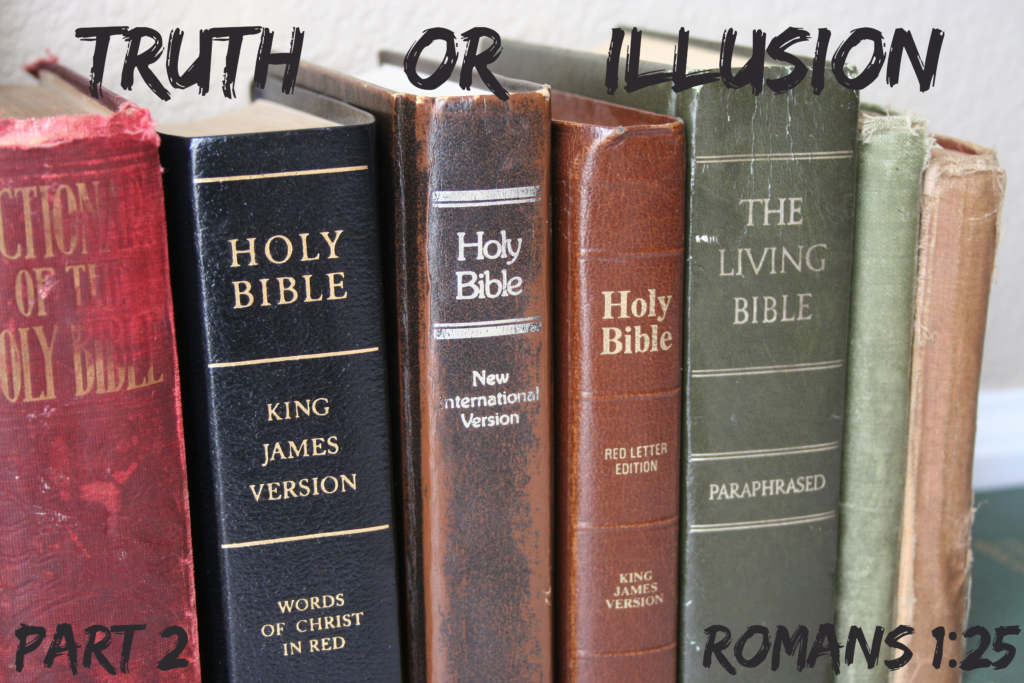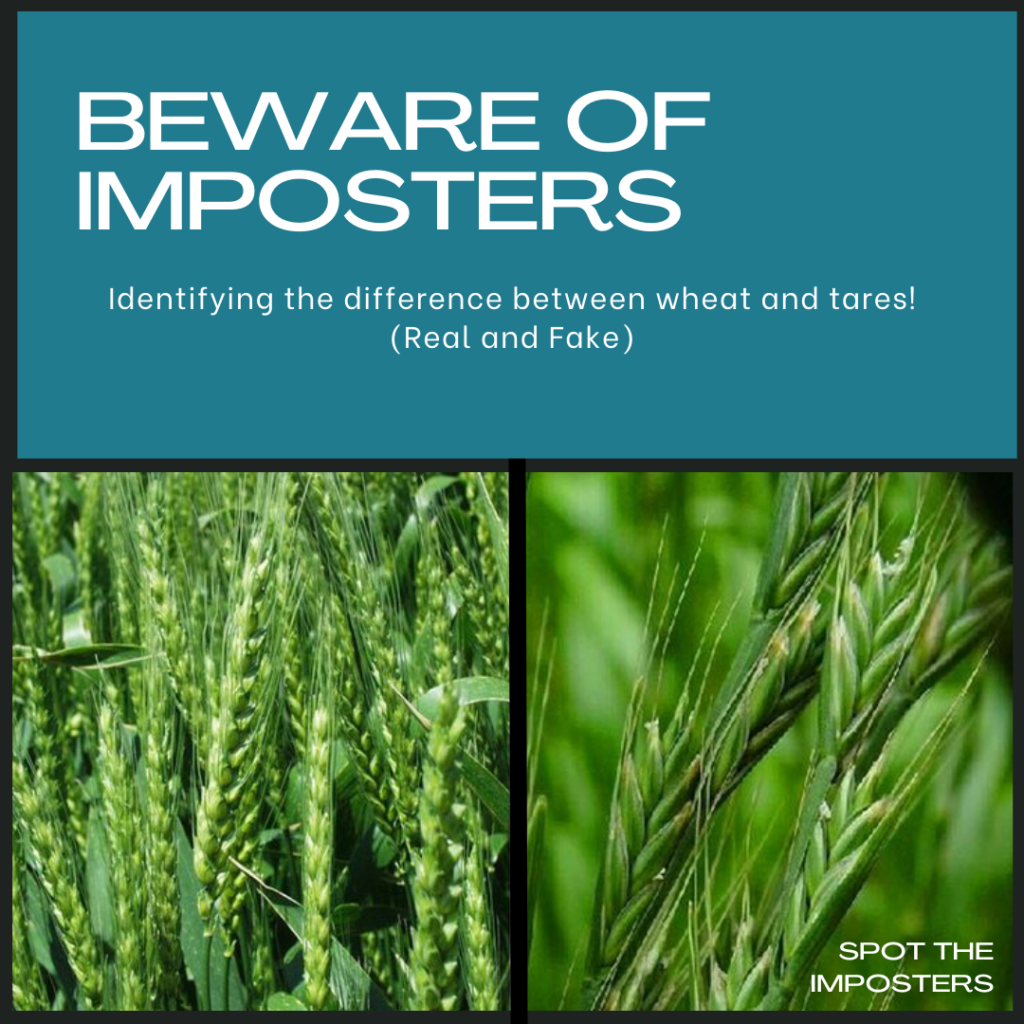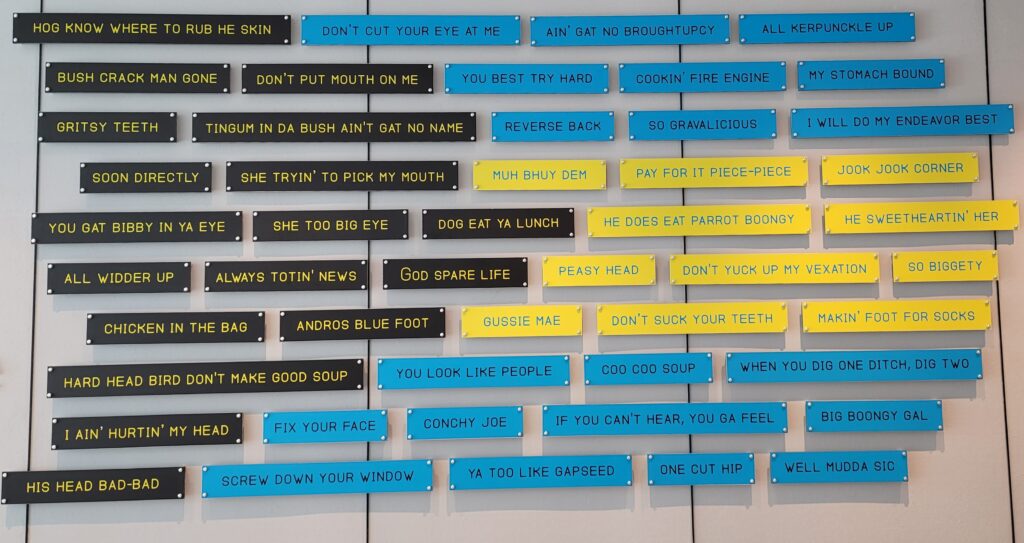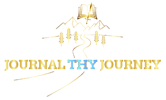
Who’s changing the TRUTH Now?
Study Activity
Must-do Activity: Grab an NIV, NLT, or ESV Bible translation and read Matthew 18:10-14 “The Parable of the Lost Sheep.” If you didn’t have access to one of these Bibles, no worries. Click on one of these links: www.biblegateway.com or www.biblestudytools.com and read it. These websites allow you to explore the passage in multiple Bible versions. We will have a discussion about this later, so please read through this passage using a couple of different versions.
22-23 – Professing to be wise, they became foolish and CHANGED the glory of the incorruptible Elohim into the likeness of an image of a corruptible man,….
25: Who changed the truth of Elohim into a lie …
In this and all Food for Thoughts I recommend you read the Scripture(s) provided and the entire chapter they are from to obtain more insight.
Beware of the Tares
Now let’s look at Matthew 13:24-30 “The parable of the Wheat and the Tares.” Here, Yahusha explains how the enemy Hêlēl (Satan) plants and grows tares (wicked people) among the wheat (Holy people or Qodashim) that 𐤉𐤄𐤅𐤄 plants. The wheat and the tares look almost identical but are entirely different. The tares are weeds that can uproot the wheat if grown too close together.

Yahusha was explaining that there were and will be imitators, impostors, and frauds living side by side with 𐤉𐤄𐤅𐤄’s children. These individuals are called tares and will mimic, deceive, and mislead others by any means necessary, wolves in sheep’s clothing (Matthew 7:15). In like manner Paul, in his letters to the Colossians, warns of these wolves or tares misleading people through philosophy, doctrines, theologies, and empty deceit (Colossians 2:8). Therefore, it’s vital to put on the full armor of 𐤉𐤄𐤅𐤄 and remain vigilant against such individuals and influences, while also ensuring that we embody the ways, precepts, and commands of 𐤉𐤄𐤅𐤄.
The parable of the wheat and tares goes much deeper, 𐤉𐤄𐤅𐤄 willing there will be a food for thought about it someday. If you understand this parable, you will realize that the rapture theology is a demon doctrine.
Study Activity Continued
Let’s go back to the Matthew 18:10-14 activity from earlier. Did you read it? If not, please take a moment to do so. If you did, did you notice anything about the scriptures? No nothing stands out, look closer. THERE IS NO VERSE 11. The NIV, NLT, ESV, and many other versions have removed some scriptures and reworded others, completely changing their meanings. Who changed the truth into a lie? It was scholars, religious leaders, and religious organizations AKA tares.
Note: Other missing scriptures from various Bibles:
John 5:4, Mathew 23:14, Mathew 17:21, Mark 7:16, Mark 9:44, Mark 9:46, Mark 11:26, Mark 15:28, Luke 17:36, John 5:4, Acts 8:37, Acts 15:34, Acts 24:7, Acts 28:29, Romans 16:24
Truth vs Illusion
Illusion
Scholars and world religious leaders argue that their translations are more accurate despite the fact that they have omitted verses, phrases, and words. They contend that their changes were necessary to more accurately match what they know to be the original text. To add insult to injure, the vast majority of these Bibles and many more have also taken the name of 𐤉𐤄𐤅𐤄 in vain and changed it as well as changing the name of the Son to Jesus. These actions are undoubtedly a gross demonic overstep, as their sources are of a flawed Greek type. However, I reiterate that they assert they use the most reliable Greek manuscripts.
Truth
As we explore the truth, keep these words and their definitions in mind:
- Hellenization: The spread of Greek culture that began after Alexander the Great’s conquest in the fourth century B.C.E.
- Renaissance: A period of European (Roman) cultural, religious, artistic, political, and economic “rebirth” following the Middle Ages. Generally described as taking place from the 14th century to the 17th century, the Renaissance promoted the rediscovery of classical philosophy, literature, and art.
- Protestant Reformation: A religious reform movement that swept through Europe in the 1500s. It resulted in the creation of a branch of Christianity called Protestantism, a name used collectively to refer to the many religious groups that separated from the Roman Catholic Church due to differences in doctrine.
It is not through ignorance that most Bible translations have numerous flaws but more of an intentional ignorance by way of agendas and demonic influence. The Protestant Reformation, led by Martin Luther, John Calvin, and others, was the launching pad for Bible translation, differing doctrines, and multiple denominations. The Reformation rightfully loosened the Roman Catholic Church’s (RCC) suffocating control, influence, and coercion power over the false religion of Christianity, as the RCC was leading people astray with harmful and misleading practices.
The RCC’s power was so strong and overwhelming that its influence reached far into government politics and laws with its papal authority. The Papal Authority authorized the Spanish Inquisition, massacres, enslavement of millions, and what they called holy wars which led to more killing, all the while calling themselves the love thy neighbor as thy self religion. Regrettably, its influence continues to do so today, as the RCC remains the largest denomination of Christianity, with over 1.278 billion members.
During the Protestant Reformation, the Holy Scriptures were translated from the original Hebrew and Aramaic languages. However, most translators used anti-Torah and anti-Hebrew theologies, reflecting their biases. Although the protestants broke free from the influence of the RCC, they continued many pagan non-biblical practices such as Sunday worship, Cross worship, pagan holidays, etc. Additionally, the reformers continued in their historical RCC hatred of the true Yahudim (Jews) and converted Jewish people did not fade away either. As the hatred persisted, the reformers, like the Greeks of old, sought to paint their image and ideology upon 𐤉𐤄𐤅𐤄’s Word to distance themselves further from the Yahudim by way of the Renaissance (1 Maccabees 3:48).
Thoughts and writings of Martin Luther showing his hatred of the Yahudim (Jews).
Martin Luther
“In this treatise, he argues that Jewish synagogues and schools be set on fire, prayer books be destroyed, rabbis forbidden to preach, Jewish homes burned, and property and money confiscated. Luther demanded that no mercy or kindness be given to Jews,[3] that they be afforded no legal protection,[4] and “these poisonous envenomed worms” should be drafted into forced labor or expelled forever.[5] He also advocates murder of all Jews, writing “[W]e are at fault in not slaying them”.[6]“
So, through the Renaissance and the Protestant Reformation, the translators aligned the translations of the Bible with their own doctrines, just like Greek Hellenization. One would think that since this book of Scriptures was for and about Yahshar’el (Israelites), their impute would be needed and valued, but it was not. Over time, multiple versions and variations led to Bible translations that are now several generations away from the original language. As a result, each Bible translation has strayed farther from the original text, becoming more watered down and distant from the truth.
Note: The RCC, Renaissance, and the Protestant Reformation are also responsible for Yahusha (Jesus) and all the other Yahshar’el (Israelites) being reimaged or reimagined as caucasian or non-melanated individuals.
Bible Translations Flaws Due to Cultural Changes and Differences
Throughout generations and the cultural changes that occur, words often change their meanings, as seen in the English language examples below.
English words Awful and Nice; what exactly do they mean? Well, it depends on the generation or era:
Awful:
- 14th century: “Frightful, terrifying, commanding great respect, worthy of reverence”
- Before 1000: “Causing dread” and “commanding reverential respect”
- 16th and 17th centuries: “Full of awe“
- Renaissance: “Solemnly impressive”
- Today: “Extremely unpleasant, shocking, or bad”
Nice:
- 14th century: Borrowed from French, “nice” meant “silly” or “foolish“
- Early 1300s: Derived from the Latin word nescius, meaning “ignorant” or “unaware”, “nice” was used to describe someone as “stupid”, “ignorant”, or “foolish” for almost a century
- 16th century: “Nice” developed a new meaning of “very particular” or “finicky”
- 19th century: “Nice” came to mean “pleasant or agreeable” and then “respectable”
- Today: “Nice” is a term of approval, often used to describe someone or something as kind, pleasing, polite, or friendly
Now, consider the challenges of translating from one language to another and then to another over the ages – from Hebrew/Aramaic to Greek, Latin, English, and ultimately into other languages. Additionally, we must consider that some translators and religious organizations had their own agendas or were working under the influence of an organization’s agenda, as we learned earlier. Also, you need to consider whether the Gentiles understood all the ins and outs of Hebrew words, whether proper or slang and if they genuinely cared to know, seeing that they hated the Yahudim and wanted nothing more than to persecute them and enslave them.

Hatred of a people in light of the topic reminds me of a wall I encountered during a recent visit to the Bahamas. This wall was adorned with vibrant Bahamian words and phrases. Despite not comprehending the meaning of every single word and expression, I gleaned some of the meanings from a local Bahamian. Though I did want to know what some of them meant, I confess I did not care to know all of them or immerse myself entirely in their culture and ways despite my love for my Bahamian brothers and sisters. Now, imagine if I hated and persecuted Bahamians. Would I decipher all these meanings correctly without bias or agenda? Would I care to know about a people I have ordered to be persecuted, murdered, and enslaved? Obviously not. If I did, I would sit down and learn from them.
How do we know the original New and Old Testament were written in Hebrew and Aramaic?
“The New Testament is filled with Aramaic words such as “Talithaqumi” in Mark 5:41, and “Corban” in Mark 7:11, or “Ephatha” in Mark 7:34 as well as many other places. What is most interesting is that in the Greek manuscripts where these Aramaic words are, it states directly after the Aramaic phrase the words “which is being translated as.” What is quite striking is you never see these words in the original Peshitta Aramaic New Testament manuscripts. So which came first, the Greek or the Aramaic? The answer is self evident by the manuscript that is clearly identifying itself as the translation.
Don Esposito – Senior Elder, Congregation of YHWH Jerusalem
Also, there are several instances in the translated Greek manuscript where the translator transliterated an Aramaic phrase into the Greek copy, with a transliterated word that does not exist in the Greek language. One such example is in Mark 3:17 where Yahshua has nicknamed two of His apostles as “B’nai Ragshee”, which in English means “Sons of thunder”, but this phrase is transliterated into the Greek as “Boanerges”, which is not a word or phrase in Greek. The fact that an Aramaic phrase is transliterated into Greek with no identical translation clearly proves that the original was the Aramaic. So very distinctly, when you do a scientific primacy test, as scholars have done, in every case the Aramaic Peshitta manuscript comes out as the original over the Greek and other Aramaic manuscripts.”
The languages spoken by Yahusha (Jesus) and His disciples were primarily Aramaic, which Yahshar’el (Israelites) learned while in Babylonian captivity, and some Hebrew, not Greek. Although the Protestant Reformation allowed biblical scholars/tares to translate the Bible into English and other languages for the masses to read and understand, many Bible translations are flawed or even corrupted. The American Bible Society acknowledges over 900 English Bible translations, and I submit that our enemy, Hêlēl (Satan), has his hand in most of them. Thankfully, we are in an era where religious organizations and governments can no longer suppress historical information. It is readily available, and 𐤉𐤄𐤅𐤄 has supplied a remnant of translators after his own heart to supply His word (Daniel 12:4).
What Bible Translations Should We Use
When accepting Bible translations from Hebrew/Aramaic to English or whatever language you read, you must obtain a verbatim copy, not an interpretation or the closest you can get.
Definition of Interpretation:
- The act or the result of interpreting: explanation
- A particular adaptation or version of a work, method, or style
- A teaching technique that combines factual with stimulating explanatory information
Definition of Verbatim:
- In the exact words: word for word
- being in or following the exact words : word-for-word
An interpretation can leave out or insert critical words or phrases while translating. Do you want to be misled by interpretations that have ignored, removed, or added phrases not found in the original text? Please look at the definition of interpretation and verbatim. We do not want an adaptation or version of a work with combined stimulating information, we need the exact word-for-word Bible translation.
Although there is no perfect Bible translation, please take care when choosing a Bible to study with. As BBBs (Bible Believing Believers), we should be mindful of paraphrased, thought-for-thought, and gender-neutral and inclusive Bibles like the NIV, NLT, and Message Bible etc,. as they can reflect the opinions and religious beliefs of the person(s) and not the true intent or spirit of the word of 𐤉𐤄𐤅𐤄.
Example of the confusion – Interpretation vs Verbatim
Revelation 22:14 – ESV, NIV, NASB, Message, CSB, NLT, and many other Bibles read:
“Blessed are those who wash their robes”
HRB, HalleluYAH Scriptures, Cepher, KJV, BYNV, Peshitta word for word translation pdf
“Blessed are the ones doing His commandments”
Bibles I use
- HRB – Hebraic Roots Bible (PDF) – Free download available. The congregation of YHWH does not charge for a hard copy of the Bible. However, they ask for a $35 donation to help print more Bibles for others to benefit that can’t afford them.
- HalleluYAH Scriptures – Free standard edition for those that cannot afford one.
- Cepher
- BYNV – Besorah of Yahusha Natsarim Version
Conclusion
𐤉𐤄𐤅𐤄 has instructed us in Duet 4:12, Proverbs 30:5–6, and Rev 22:18–19 that we are not to add, supplement, take away, or diminish His Word. Traditions and human opinions must not be equated with it. We must not change the meaning of the text by deleting and adding phrases and passages or removing books. We must not knowingly misrepresent, change, or falsify what is in the original. BBBs must submit to the Word of 𐤉𐤄𐤅𐤄 and allow it to fully live within us richly (Colossians 3:16) so that it might instruct, reproof, correct, and train us in righteousness so that we might be perfected. (2 Timothy 3:16–17). Lastly, we must not stand with or accept others who do these abominable things.
By: David Edwards – HalleluYAH – Praise YAH – Praise 𐤉𐤄𐤅𐤄

